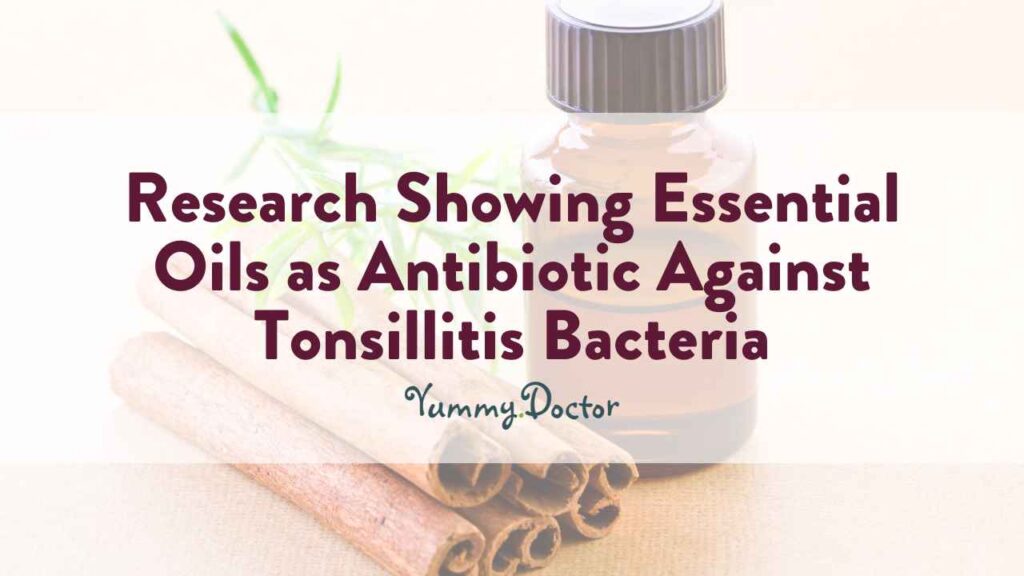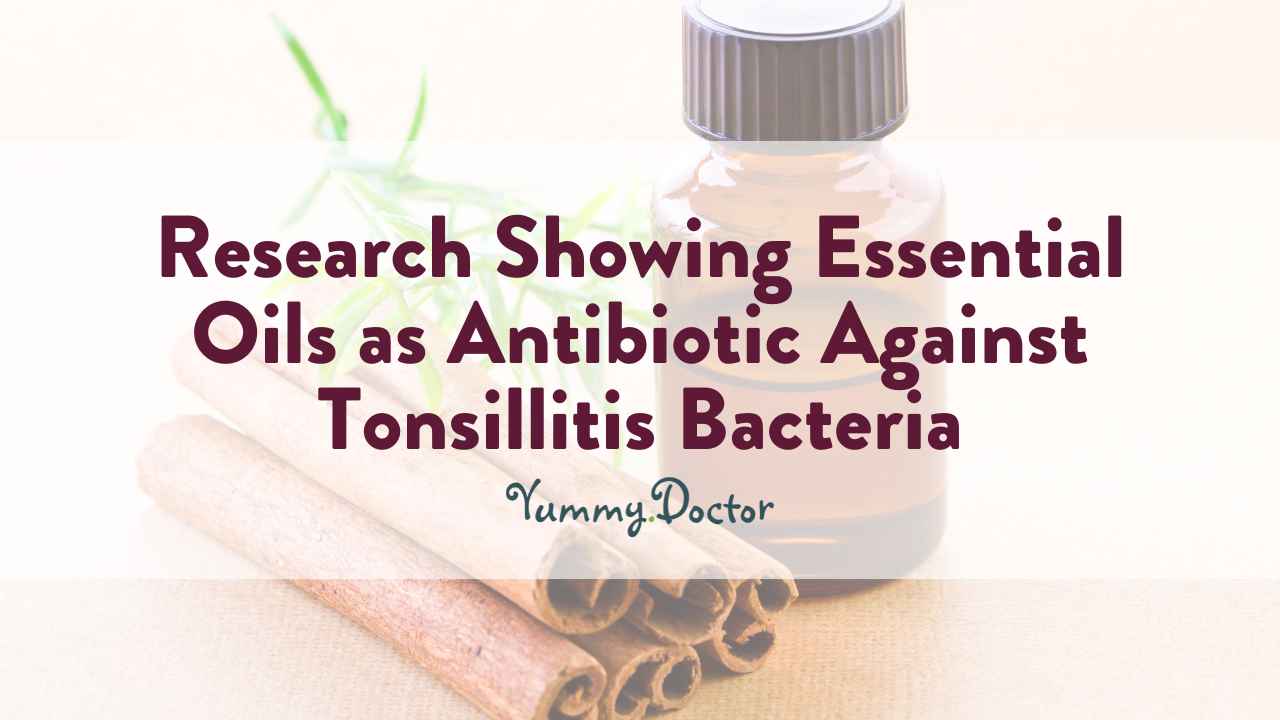Research Showing Essential Oils as Antibiotic Against Tonsillitis Bacteria


By: Case Adams
RealNatural.org
Research from France’s University of Angers has determined that certain essential oils are effective in killing the bacteria known to cause tonsillitis.
The researchers utilized 18 different essential oils provided by a French manufacturer of essential oils. The researchers tested essential oils of Cinnamon (Cinnamomum verum), Lemongrass (Cymbopogon citratus), Oregano (Origanum compactum), Thyme (Thymus vulgaris – two species), Winter Savory (Satureja montana), Clove (Eugenia caryophyllus), Palmarosa lemongrass (Cymbopogon martinii), Camphor (Cinnamomum camphora – two species), Peppermint (Mentha piperita), Marjoram (Origanum marjorana), Lavender (Lavandula stoechas), Cajeput (Melaleuca cajuputi), Tea tree (Melaleuca alternifolia), Basil (Ocimum basilicum), Naiouli Tea tree (Melaleuca quinquenervia), and Rosemary (Rosmarinus officinalis).
The researchers extracted the bacteria Streptococcus pyogenes from the throat (pharynx) of a child who had tonsillitis. They incubated the bacteria and then tested each of the essential oils against it.
The researchers found 14 of the 18 essential oils had antibacterial activity against the Streptococcus pyogenes bacterial. Of these the Cinnamon oil, the Thyme oil, the Lemongrass oil, the Marjoram oil, and the Winter Savory oil had the greatest antibiotic activity against the tonsillitis bacteria S. pyogenes.
The zone of inhibition for these five oils with the most antibiotic potential ranged from 48 to 35 millimeters. (Note that the greater the zone of inhibition, the stronger the antibiotic potency.)
Two other oils – Clove oil and Palmarosa lemongrass oil – came in at 18 and 15 mm respectively. The remaining seven oils with antibiotic activity against the S. pyogenes ranged from 13 to 9 mm zone of inhibition. They were Camphor oil (CT linalool), Peppermint oil, Thyme oil (CT thujanol), Marjoram oil, Lavender oil, Cajeput oil, and Tea tree oil.
The obvious question is how this antibacterial activity, measured by inhibition zone, measures up against those of the most successful antibiotics. Well, a 2009 study published in the Journal of Bacteriology measured precisely that: The inhibition zones of the most popular antibiotics against Streptococcus pyogenes.
Zones of inhibition against S. pyogenes of Amoxicillin was 22.3 mm, Ampicillin 34.5 mm, Ampiciox 18.7 mm, Chloramphenicol 22.0 mm, Ciprofolxacin 30 mm, Erythromycin 14.5 mm, Fulcin 6.0 mm, Gentamicin 2.0 mm, Penicillin 39.0 mm, Rifampicin 27.0 mm, Septrin 19.0 mm, Tetracycline 10.5 mm, and Vancomycin 14.5 mm. The average Zone of inhibition for the entire range of 13 antibiotics against S. pyogenes was 20.1, and as mentioned, the greatest was Penicillin at 39.
This compares to zones of inhibition between 48 mm and 35 mm for the Cinnamon oil, the Thyme oil, the Lemongrass oil, the Marjoram oil, and the Winter Savory oil.
And we must add to this that the 2009 study tested antibiotics that many species of bacteria – including some S. pyogenes – have since become more resistant to. During these past four years, many of these pharmaceutical antibiotics have lost some of their antibiotic potency against S. pyogenes and other bacteria.
The researchers noted that the essential oils’ antibiotic mechanisms varied, and ranged from their monoterpene content, aldehydes such as cinnamaldehyde (Cinnamon), phenols such as thymol, carvacrol, eugenol and others, and many other compounds.
Other studies have also indicated some essential oils are significantly antibiotic. Thyme and Lavender oils in particular have been found to have significant activity against some bacteria. In 2011, Moroccan researchers also found that two species of Thyme essential oil were synergistic with antibiotic therapy.
See Also:
Why Essential Oils Heal and Drugs Don’t
REFERENCES:
Sfeir J, Lefrançois C, Baudoux D, Derbré S, Licznar P. In Vitro Antibacterial Activity of Essential Oils against Streptococcus pyogenes. Evid Based Complement Alternat Med. 2013;2013:269161.
Fadli M, Saad A, Sayadi S, Chevalier J, Mezrioui NE, Pagès JM, Hassani L. Antibacterial activity of Thymus maroccanus and Thymus broussonetii essential oils against nosocomial infection – bacteria and their synergistic potential with antibiotics. Phytomedicine. 2012 Mar 15;19(5):464-71.
Nkang AO, Okonko IO, Fowotade A, Udeze AO, Ogunnusi TA, Fajobi EA, Adewale OG, Mejeha OK. Antibiotics susceptibility profiles of bacteria from clinical samples in Calabar, Nigeria. Jnl Bacter. 2009 Nov 1(8):089-096.
Join Amandha’s Private Community!
Participate in specific health related groups, engage with holistic healers, educate yourself with step-by-step online courses, join Amandha in weekly video chats, and reach the ultimate natural health lifestyle.
![]()
Amandha D Vollmer (ADV)
BSc, Herbalist, Reiki Master,
Holistic Health Practitioner,
Degree of Doctor of Naturopathic Medicine
Websites:
Bringing the Wisdom of Nature Education: https://yummy.doctor/
YumNaturals Emporium Store: https://yumnaturals.store/
DMSO Products: https://DMSO.store
Healing with DMSO Book: https://healingwithdmso.com/
Support my Work by Making a Donation:
YUM BTC (Bitcoin) – bc1qayv9rjzlpc8hlc0t5d80le8u0g72f5p75570hz
YUM ETH (Ethereum) – 0xD4AE2Ae316435e4e68DC0c5D2131c2252fD9B0c4
https://yumnaturals.store/product/general-fee-or-donation/
https://www.patreon.com/yumnaturals
Telegram Chats:
1. ADV’s Main Channel: https://t.me/amandhavollmer
2. ADV’s Legal/Lawful Templates Group: https://t.me/HDoT_Templates
3. ADV’s Local Ontario Group: https://t.me/ontarioawake
Advice Disclaimer:
The website content, including but not limited to blogs, newsletters and videos with Amandha Vollmer are intended for general information only, and are not intended to be a substitute for legal, medical or financial advice, and should not be construed as legal, medical or financial advice applicable to your particular situation. No attorney-client or confidential relationship is or will be formed by use of this website or the contents within.

